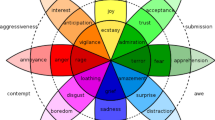Abstract
An iPad serious game in emotion learning is presented in this chapter for children with special needs, such as autism spectrum disorder. Some of the children with special needs suffer in recognizing their own emotional states and/or other people’s emotional states. They may lack appropriate strategies to deal with ever-changing emotional states. They have difficulty in knowing how to interpret the emotional states of others and to react to their emotional feelings, such as anger , sadness, and so on. Often their reactions may not match their emotional states. With rapid developments in technology nowadays, mobile devices, including iPad, and their software applications are gaining popularity as an educational tool. It can help create potential treatments for children with special needs. The touch screen and simple human–machine interface make iPad user friendly for children with coordination or learning difficulties. With this technology, it is possible to create serious game applications suitable for children with special needs to learn, understand, and react to emotions in different scenarios. By incorporating embedded videos to mimic basic daily life scenarios , iPad serious games aim to recreate the emotions allowing children with special needs to learn recognizing their own emotional states and the emotional states of others around them.
Access this chapter
Tax calculation will be finalised at checkout
Purchases are for personal use only
Similar content being viewed by others
References
Abirached, B., Zhang, Y., Park, J.H.: Understanding user needs for serious games for teaching children with autism spectrum disorders emotions. In: World Conference on Educational Media and Technology (2012).
Alves, S., Marques, A., Queirós, C., Orvalho, V.: LifeisGame prototype: a serious game about emotions for children with autism spectrum disorders. PsychNol. J. 11(3), 191–211 (2013)
American Psychiatric Association (2013). Diagnostic and Statistical Manual of Mental Disorders, 5th edn. https://doi.org/10.1176/appi.books.9780890425596
Barendse, E.M., Hendriks, M.P.H., Thoonen, G., Aldenkamp, A.P., Kessels, R.P.C.: Social behaviour and social cognition in high-functioning adolescents with autism spectrum disorder (ASD): two sides of the same coin? Cogn. Process. 19, 545–555 (2018). https://doi.org/10.1007/s10339-018-0866-5
Baron-Cohen, S., Golan, O., Ashwin, E.: Can emotion recognition be taught to children with autism spectrum conditions? Philos. Trans. R. Soc. B Biol. Sci. 364(1535), 3567–3574 (2009). https://doi.org/10.1098/rstb.2009.0191
Carvalho, V., Brandão, J., Cunha, P., Vasconcelos, J., Soares, F.: Tobias in the zoo—A serious game for children with autism spectrum disorders. Int. J. Advan. Corp. Learn. 8(3), 23 (2015). https://doi.org/10.3991/ijac.v8i3.4897
Cohen, M.J., Sloan, D.L.: Visual Supports for People with Autism: A Guide for Parents and Professionals. Woodbine Hpuse, Bethesda (2007)
Corsello, C.M.: Early intervention in autism. Infants Young Child. 18(2), 74–85 (2005)
Fridenson-Hayo, S., Berggren, S., et al.: Emotiplay’: a serious game for learning about emotions in children with autism: results of a cross-cultural evaluation. Eur. Child Adolesc. Psychiat. 26(7), 979–992 (2017). https://doi.org/10.1007/s00787-017-0968-0
Gold, C., Wigram, T., Elefant, C.: Music therapy for autistic spectrum disorder. Cochr. Database System. Rev. (2006). https://doi.org/10.1002/14651858.CD004381.pub2
Hopkins, I.M., Gower, M.W., Perez, T.A., et al.: Avatar assistant: improving social skills in students with an ASD through a computer-based intervention. J. Autism Dev. Disord. 41(11), 1543–1555 (2011). https://doi.org/10.1007/s10803-011-1179-z
Kaplan, R.S., Steele, A.L.: An analysis of music therapy program goals and outcomes for clients with diagnoses on the autism spectrum. J. Music Ther. 42(1), 2–19 (2005). https://doi.org/10.1093/jmt/42.1.2
KarenTBTEN: The iPad: a useful tool for Autism. HubPages. https://hubpages.com/health/ipad-for-autism (2014)
Erik, M., Schuller, B., et al.: The ASC-inclusion perceptual serious gaming platform for autistic children. IEEE Trans. Games 11(4), 328–339 (2018). https://doi.org/10.1109/TG.2018.2864640
Randi, J., Newman, T., Grigorenko, E.L.: Teaching children with autism to read for meaning: challenges and possibilities. J. Autism Dev. Disord. 40(7), 890–902 (2010). https://doi.org/10.1007/s10803-010-0938-6
Serret, S., Hun, S., Iakimova, G., et al.: Facing the challenge of teaching emotions to individuals with low- and high-functioning autism using a new serious game: a pilot study. Mol. Autism 5, 37 (2014). https://doi.org/10.1186/2040-2392-5-37
Sturm, D., Peppe, E., Ploog, B.: eMot-iCan: design of an assessment game for emotion recognition in players with autism. In: IEEE International Conference on SeGAH (2016). https://doi.org/10.1109/SeGAH.2016.7586228
Tanaka, J.W., Wolf, J.M., et al.: Using computerized games to teach face recognition skills to children with autism spectrum disorder: the Lets Face It! Program. J. Child Psychol. Psychiat. 51(8), 944–952 (2010). https://doi.org/10.1111/j.1469-7610.2010.02258.x
Tissot, C., Evans, R.: Visual teaching strategies for children with autism. Early Child Dev. Care 173(4), 425–433 (2003). https://doi.org/10.1080/0300443032000079104
Acknowledgements
The authors would like to thank the students, teachers, staffs, principal, and parents of AWWA School for their support, help, and feedback in this research work.
Author information
Authors and Affiliations
Corresponding author
Editor information
Editors and Affiliations
Rights and permissions
Copyright information
© 2021 The Author(s), under exclusive license to Springer Nature Singapore Pte Ltd.
About this chapter
Cite this chapter
Goh, Z.H.J., Cao, Q., Chen, J., Cai, Y. (2021). iPad Serious Game to Aid Children with Special Needs in Emotion Learning. In: Cai, Y., Cao, Q. (eds) When VR Serious Games Meet Special Needs Education. Gaming Media and Social Effects. Springer, Singapore. https://doi.org/10.1007/978-981-33-6942-9_10
Download citation
DOI: https://doi.org/10.1007/978-981-33-6942-9_10
Published:
Publisher Name: Springer, Singapore
Print ISBN: 978-981-33-6941-2
Online ISBN: 978-981-33-6942-9
eBook Packages: Intelligent Technologies and RoboticsIntelligent Technologies and Robotics (R0)




